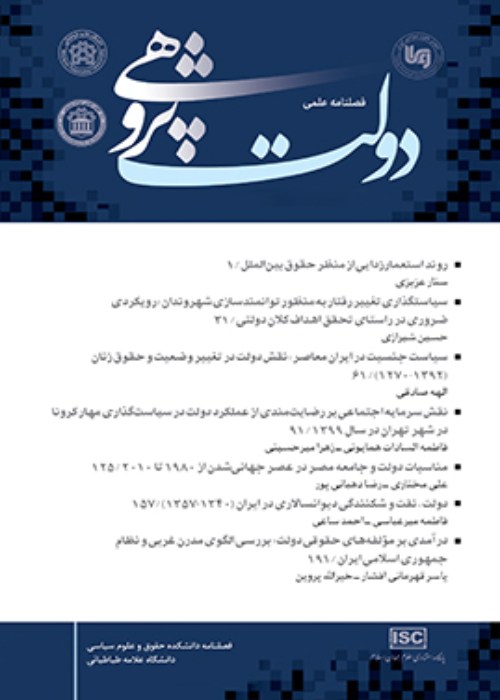Identifying the Criteria for Assessing the Capacity of Fragile States in Planning for Development and Poverty Reduction
Author(s):
Article Type:
Research/Original Article (دارای رتبه معتبر)
Abstract:
Imagining government as a powerful and all-encompassing institution which effectively controls a geopolitical area has affected the basic role of this institution in the development discourse. Because the government is considered as the main basis of political, economic and social order, its representative role is significant. Today, many thinkers and international organizations believe that the government still plays an essential role in advancing the process of development and poverty reduction but the problem is that always some governments have not been able or willing to play the expected roles. Many governments, due to various social, political, economic and structural reasons do not have the ability and capacities necessary for carring out development and poverty reduction, or basically do not show much political desire and will in this regard. Since the 1990s, those states that their governments lack the necessary ability to perform normal functions and lead their society to development have been known as fragile states. This is a concept that is more related to developing countries. On the basis of this, the main question of the current research is "what are the criteria for evaluating the capacity and willingness of fragile states in planning for development and poverty reduction?" The research method used in this research is systematic review and information are collected using library tools and internet resources. The theoretical framework of the research is based on Torres and Anderson (2004). From the point of view of Torres and Anderson, the development capacities of a government include the foundations of government authority, administrative capacity and efficiency, economic efficiency and the effective exercise of political power. A government that lacks these capacities or has these features just to a limited extent will lose its capacity and ability to advance development and reduce poverty to a large extent. In addition, from thier point of view, along with these features, the political will for development and poverty reduction must exist at the top of the government. In other word there should be an explicit political statement that shows the commitment and desire of a government to advance development and poverty reduction programs. As well, in this direction, attention should be paid to the existence of strategies, tools and motivations for implementation, so that services are provided in the best possible way and has the character of inclusiveness. Finally, Torres and Anderson (2004) present a fourfold typology of governments (weak willingness and capacity governments, strong willingness and weak capacity governments, strong willingness and capacity governments, and weak willingness and strong capacity governments) that can be used to identify the criteria for evaluating the capacity of fragile states in development planning and poverty reduction. The results of the research findings show that governments in fragile states could have a proper planning in order to improve development capacities and reduce poverty by strengthening the foundations of authority, effective exercise of political power, efficiency in macroeconomic management, administrative capacity for implementation, along with the political commitment to reduce poverty and provide comprehensive services. Based on this, the governments that have weak political desire and will, even if they have the necessary capacities for development and poverty reduction, will not succeed. Similarly, those states that have a strong political desire and will but lack the necessary capacities, will not be successful. In transition countries, where governments are usually more fragile, rapid changes may lead to instability. Therefore, it should be emphasized on gradual reforms and more accountability of governments in these countries. As the Iraq experience clearly shows, dramatic changes—including a sudden move toward fully competitive elections—in countries with weak cohesion, fragile institutions, and a history of intergroup hostility can be highly explosive and undermine the entire reform agenda. So, it is better to give priority to solidarity and security and gradually carry out broader reforms in the field of development and poverty reduction so that do not explicitly threaten the status quo. Limits such as increasing transparency and carrying out budgeting methods, strengthening non-governmental organizations, creating a strong civil society, strengthening public cohesion and trust, increasing income and reducing unemployment, improving the rule of law and the government's capacity to judge and implement it can improve relations between governments and people and provide the basis for other actions. It seems that the biggest determining factors eventually are the government, its leadership, policies and institutions; This does not mean ignoring the role of the society as sustainable development requires roles of both government and society. The development-seeking government and the development-seeking society, with their desire and high capacities for development, are the key to success in the advancing development and poverty reduction.
Keywords:
Language:
Persian
Published:
Studies the State, Volume:9 Issue: 33, 2023
Pages:
223 to 258
magiran.com/p2579034
دانلود و مطالعه متن این مقاله با یکی از روشهای زیر امکان پذیر است:
اشتراک شخصی
با عضویت و پرداخت آنلاین حق اشتراک یکساله به مبلغ 1,390,000ريال میتوانید 70 عنوان مطلب دانلود کنید!
اشتراک سازمانی
به کتابخانه دانشگاه یا محل کار خود پیشنهاد کنید تا اشتراک سازمانی این پایگاه را برای دسترسی نامحدود همه کاربران به متن مطالب تهیه نمایند!
توجه!
- حق عضویت دریافتی صرف حمایت از نشریات عضو و نگهداری، تکمیل و توسعه مگیران میشود.
- پرداخت حق اشتراک و دانلود مقالات اجازه بازنشر آن در سایر رسانههای چاپی و دیجیتال را به کاربر نمیدهد.
In order to view content subscription is required
Personal subscription
Subscribe magiran.com for 70 € euros via PayPal and download 70 articles during a year.
Organization subscription
Please contact us to subscribe your university or library for unlimited access!


